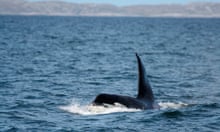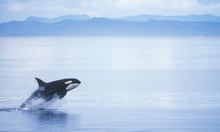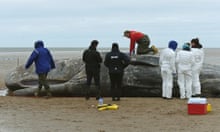In January, 29 sperm whales stranded on shores around the North Sea. The results of the necropsies (the animal equivalent of autopsies) of 13 of those whales, which beached in Germany, near the town of Tönning in Schleswig-Holstein, have just been released. The animals’ stomachs were filled with plastic debris. A 13-metre-long fishing net, a 70cm piece of plastic from a car and other pieces of plastic litter had been inadvertently ingested by the animals, who may have thought they were food, such as squid, their main diet, which they consume by sucking their prey into their mouths.
Robert Habeck, environment minister for the state of Schleswig-Holstein, said: “These findings show us the results of our plastic-oriented society. Animals inadvertently consume plastic and plastic waste, which causes them to suffer, and at worst, causes them to starve with full stomachs.” Nicola Hodgins, of Whale and Dolphin Conservation, added: “Although the large pieces will cause obvious problems and block the gut, we shouldn’t dismiss the smaller bits that could cause a more chronic problem for all species of cetacean – not just those who suction feed.”
The notion of these vast, sentient and placid creatures being stuffed with our trash is emblematic enough of the unequal relationship between man and sperm whale. The fact that the latter possess the largest brains of any animal that has ever lived only underlies this disconnection.
Sadly, to anyone who follows the ongoing story of our impact on cetaceans, the terrible predicament of German whales is not new – although the scale of last January’s strandings is. In 2011, a young sperm whale was found floating dead off the Greek island of Mykonos. Its stomach was so distended that scientists believed that the animal might have swallowed a giant squid. But when they dissected its four stomachs (sperm whales, although predators, have digestive processes similar to ruminants), they found almost 100 plastic bags and other pieces of debris. One bag had the telephone number of a souvlaki restaurant in Thessaloniki. The scientists joked, grimly, that the whale could not call up to complain about the damage caused by their product.
The scale of the fate of the North Sea whales calls to mind the nesting albatrosses of Midway Island, so poignantly recorded by photographer Chris Jordan. He documented the skeletal remains of young chicks, so bloated with the plastic they had been mistakenly fed by their parents – from beer can loops and bottle tops to cigarette lighters – that they had starved from lack of nutrition.
Our use and abuse of animals seems in inverse proportion to the almost ritual reverence in which we purport to hold them. Whales have become the marine icon of ecological threat. We pay obeisance to their grandeur. But sometimes I wonder if it isn’t all an illusion. We congratulate ourselves for having stopped hunting them (well, most of them). Yet many thousands of cetaceans are compromised or killed by the pollution we allow to escape into the ocean. We cannot make the direct connection between the plastic bottles of water and what they are doing to the ultimate source of their supply. Whales are still victims of our industrialisation, our insatiable thirst for growth at the expense of all else – if in not such a direct way as they were in the past.
Recently, visiting the secret storage unit where London’s Natural History Museum stows the thousands of specimens that they are unable – or reluctant – to display in the museum, the curator of vertebrates, Richard Sabin, showed me a nondescript cardboard box in a corner. He suggested I look inside. When I opened it, I found block after block of solid, pure, spermaceti wax, the solidified oil from the sperm whale’s head.
Whales, in boxes – that’s how we saw them. It was for this substance that American and British whaleships travelled to the South Seas. This stuff that, when liquid, lit the streets of London, New York, Berlin and Paris. It made candles and makeup; lubricated the machines of the industrial revolution. So fine is spermaceti oil that Nasa used it in their space mission, as it does not freeze in outer space.
It is the materiality of the whale that haunts me. What it has provided, albeit unwittingly, to allow us to furnish and light our own lives. Even sperm whale excretions – in the form of ambergris – are the most valuable natural substances known to us, still used as a fixative in high-fashion perfumes. Set that usage against what we now know to be cultural animals, deeply bound by family ties. Of course, it is what makes us most alike that ultimately touches us – and which may be the saving of us both. I told Meera Syal, when we met at Radio 4 the other day, that whale society is entirely matriarchal, and in some species, male whales stay with their mothers all their lives. “Ah,” she said, “they’re Indian whales.”









